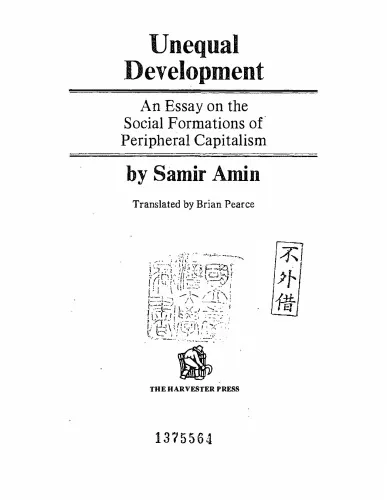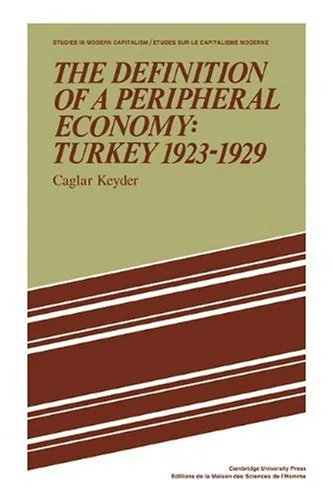Unequal Development: An Essay on the Social Formations of Peripheral Capitalism
4.5
بر اساس نظر کاربران

شما میتونید سوالاتتون در باره کتاب رو از هوش مصنوعیش بعد از ورود بپرسید
هر دانلود یا پرسش از هوش مصنوعی 2 امتیاز لازم دارد، برای بدست آوردن امتیاز رایگان، به صفحه ی راهنمای امتیازات سر بزنید و یک سری کار ارزشمند انجام بدینکتاب های مرتبط:
مقدمهای بر کتاب 'Unequal Development: An Essay on the Social Formations of Peripheral Capitalism'
کتاب 'Unequal Development: An Essay on the Social Formations of Peripheral Capitalism' نوشتهٔ سمیر امین، به بررسی و تحلیل ابعاد نابرابری در توسعهٔ جهانی میپردازد. سمیر امین به عنوان یک اقتصاددان و متفکر برجسته شناخته میشود که نقدهای نوآورانهاش بر نظام سرمایهداری توجه بسیاری را به خود جلب کرده است.
خلاصهای جامع از کتاب
در 'Unequal Development'، سمیر امین به بررسی نظریات پیرامون توسعه و نابرابری در سطح جهانی پرداخته و چالشهای مربوط به آن را تحلیل میکند. او به تبیین روشهای مختلف Capitalism پرداخته و تأثیرات آن بر کشورهای Peripheral را بررسی مینماید. امین نشان میدهد که چگونه ساختارهای قدرت و اقتصادی که در مراکز سرمایهداری شکل گرفتهاند، سیستم جهانی نابرابری را تقویت کرده و موجب تداوم آن میگردند.
نکات کلیدی
- تأثیر Capitalism بر توسعه نابرابر در جوامع Peripheral
- بررسی ساختارهای اقتصادی و قدرت در سیستم جهانی
- نقد سیستم جهانی بر مبنای نابرابری و سلطهطلبی
- ارائه راهکارهایی برای توسعه عادلانه و متوازن
جملات معروف از کتاب
سمیر امین در این کتاب بیان میکند: "توسعه به خودی خود دارای اهمیت نیست، بلکه شکل و جهتگیری آن است که میتواند به عدالت یا نابرابری بینجامد."
چرا این کتاب مهم است
این کتاب به طور ویژه برای درک پیچیدگیهای اقتصاد جهانی و روابط قدرت ضروری است. سمیر امین با نقدهای عمیقش به سیستم سرمایهداری، به خوانندگان نشان میدهد که چگونه نابرابریهای اقتصادی و اجتماعی را میتوان درک و تحلیل کرد. 'Unequal Development' برای دانشجویان، محققان و علاقهمندان به اقتصاد سیاسی و توسعه جهانی یک منبع ارزشمند به شمار میآید.
Introduction to 'Unequal Development: An Essay on the Social Formations of Peripheral Capitalism'
"Unequal Development: An Essay on the Social Formations of Peripheral Capitalism" is a seminal work by Samir Amin that delves into the complexities of global economic disparities. As a centerpiece of dependency theory, this book explores the intrinsic mechanisms of capitalism that perpetuate inequality between central and peripheral nations. By examining both historical and contemporary contexts, Amin provides a comprehensive analysis of how economic and social structures contribute to uneven development across the globe.
Detailed Summary of the Book
The essence of "Unequal Development" lies in its critical exploration of how capitalist systems inherently lead to disparities between what Amin terms as "center" and "peripheral" countries. The center countries, primarily the developed nations, are depicted as leveraging their economic and political power to maintain dominance over the peripheral nations, often former colonies or less developed countries.
Amin argues that development in capitalist societies is not homogenous or equitable. Rather, it is skewed by structures that promote the enrichment of the center at the expense of the periphery. He delves into the historical roots of these imbalances, tracing them back to colonial exploitation and the imposition of capitalist economic models that favor the center. Through the lens of political economy, Amin dismantles the myth of harmonious global development, showing instead that the system is rigged to preserve and perpetuate inequalities.
In his analysis, Amin highlights how trade imbalances, exploitative labor practices, and unequal capital flows all serve to widen the gap between rich and poor nations. He also explores the social formations that arise from these economic conditions, including the alteration of class structures within peripheral nations as a direct consequence of external economic pressures.
Key Takeaways
The concept of "peripheral capitalism" is critical to understanding global inequality, where peripheral countries remain subservient to central powers.
Historical context, such as colonialism, plays a crucial role in shaping current economic disparities.
Capitalism inherently generates unequal development, with the benefit of wealth accrual largely accruing to developed nations.
Structural reforms, rather than superficial aid, are necessary for truly equitable development.
Famous Quotes from the Book
"Development is a structured, unequal, and imbalanced process where some regions exploit others."
"The fantasy of a world market is dangerous because it ignores the power dynamics embedded within."
Why This Book Matters
Samir Amin's "Unequal Development" is not merely an academic treatise; it is a call to acknowledge and address the persistent inequalities enforced by global capitalism. The book provides a critical framework for policy-makers, scholars, and activists to understand and challenge the mechanisms that perpetuate underdevelopment. Its insights into the structural facets of global capitalism remain relevant to current debates on inequality, globalization, and economic justice.
In the wake of increasing globalization and its associated challenges, "Unequal Development" offers a crucial perspective on why some nations thrive while others struggle. Amin's incisive critique empowers readers to question accepted economic narratives and seek more equitable pathways to global development.
دانلود رایگان مستقیم
شما میتونید سوالاتتون در باره کتاب رو از هوش مصنوعیش بعد از ورود بپرسید
دسترسی به کتابها از طریق پلتفرمهای قانونی و کتابخانههای عمومی نه تنها از حقوق نویسندگان و ناشران حمایت میکند، بلکه به پایداری فرهنگ کتابخوانی نیز کمک میرساند. پیش از دانلود، لحظهای به بررسی این گزینهها فکر کنید.
این کتاب رو در پلتفرم های دیگه ببینید
WorldCat به شما کمک میکنه تا کتاب ها رو در کتابخانه های سراسر دنیا پیدا کنید
امتیازها، نظرات تخصصی و صحبت ها درباره کتاب را در Goodreads ببینید
کتابهای کمیاب یا دست دوم را در AbeBooks پیدا کنید و بخرید
1548
بازدید4.5
امتیاز0
نظر98%
رضایتنظرات:
4.5
بر اساس 0 نظر کاربران
Questions & Answers
Ask questions about this book or help others by answering
No questions yet. Be the first to ask!















